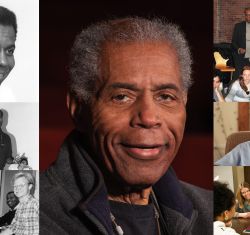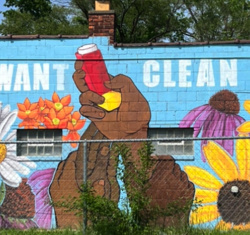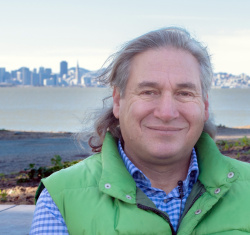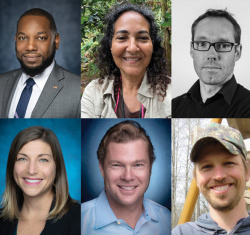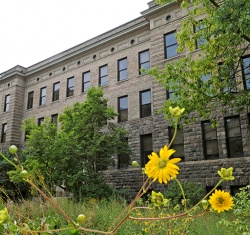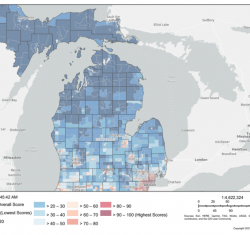
 back to all faculty
back to all faculty
Paul Mohai

About
Professor Mohai recently returned from a leave of absence to serve as Senior Policy Advisor at the U.S. Environmental Protection Agency's Office of Environmental Justice. His teaching and research interests are focused on environmental justice, public opinion and the environment, and influences on environmental policy making. He is a founder of the Environmental Justice Program at the University of Michigan and a major contributor to the growing body of quantitative research examining disproportionate environmental burdens and their impacts on low income and people of color communities. In 1990, he co-organized with Dr. Bunyan Bryant the “Michigan Conference on Race and the Incidence of Environmental Hazards”, which was credited by the U.S. Environmental Protection Agency as one of two events bringing the issue of Environmental Justice to the attention of the Agency. He is author or co-author of numerous articles, books, and reports focused on race and the environment, including “Black Environmentalism“, Environmental Racism: Reviewing the Evidence”, “Race and the Incidence of Environmental Hazards”, “Toxic Waste and Race at Twenty”, “Which Came First, People or Pollution?” and “Environmental Justice and the Flint Water Crisis”. His research involves national level studies examining the causes of environmental disparities and the role environmental factors play in accounting for racial and socioeconomic disparities in health. He is currently Lead Investigator on a project for the U.S Environmental Protection Agency’s (EPA) to advance development and use of the EPA’s leading environmental justice screening tool, EJSCREEN.
Professor Mohai is a member of the Michigan Advisory Council on Environmental Justice to the State of Michigan and a past member of the National Environmental Justice Advisory Council (NEJAC) to the U.S. EPA (2007-2013). He is also a member of the Advisory Board of the Global Environmental Justice Movement Project (ENVJUSTICE) which is documenting and mapping environmental justice conflicts around the world (http://www.envjustice.org/). Professor Mohai has provided testimony on environmental justice to the U.S. House of Representatives in 1993, 1999, and 2019, the U.S. Senate in 2007, and the Michigan Civil Rights Commission in 2016.
Publications
- Grier, Laura, Delia Mayor, Brett Zeuner, and Paul Mohai. 2022. “Community Input on State-Specific Environmental Justice Screening Tools.” Environmental Law Reporter 52(6): 10441.
- Zrzavy, Arianna, Molly Blondell, Wakako Kobayashi, Bryan Redden, and Paul Mohai. 2022. "Addressing Cumulative Impacts: Lessons from Environmental Justice Screening Tool Development and Resistance." Environmental Law Reporter 52(2): 10111.
- Mohai, Paul. 2020. “Measuring Environmental Injustice.” Pages 52-76 in Mascarenhas, Michael, editor, Lessons in Environmental Justice: From Civil Rights to Black Lives Matter and Idle No More. SAGE Publications
- Mohai, Paul, and Bunyan Bryant. 2020, "Thirty Years Working for Environmental Justice: Commemorating the 1990 Michigan Conference on Race and the Environment and Looking Toward the Future." NEW SOLUTIONS: A Journal of Environmental and Occupational Health Policy 30(3): 204-210.
- Mohai, Paul, and Byoung-Suk Kweon. 2020. Michigan School Siting Guidelines: Taking the Environment into Account.
- Glatter-Götz, Helene, Paul Mohai, Willi Haas, and Christoph Plutzar. 2019. "Environmental inequality in Austria: do inhabitants’ socioeconomic characteristics differ depending on their proximity to industrial polluters?." Environmental Research Letters 14(7): 074007.
- Kweon, Byoung-Suk, Paul Mohai, Sangyun Lee, and Amy M. Sametshaw. 2018. "Proximity of public schools to major highways and industrial facilities, and students’ school performance and health hazards." Environment and Planning B: Urban Analytics and City Science 45(2): 312-329.
- Mohai, Paul. 2018. "Environmental justice and the Flint water crisis." Michigan Sociological Review 32: 1-41.
- Mohai, Paul, and Robin Saha. 2015. "Which came first, people or pollution? Assessing the disparate siting and post-siting demographic change hypotheses of environmental injustice." Environmental Research Letters 10(11): 115008.
- Mohai, Paul, and Robin Saha. 2015. "Which came first, people or pollution? A review of theory and evidence from longitudinal environmental justice studies." Environmental Research Letters 10(12): 125011.
- Perez, Alejandro Colsa, Bernadette Grafton, Paul Mohai, Rebecca Hardin, Katy Hintzen, and Sara Orvis. 2015. "Evolution of the environmental justice movement: activism, formalization and differentiation." Environmental Research Letters 10(10): 105002.
- Lee, Sangyun, and Paul Mohai. 2012. "Environmental justice implications of brownfield redevelopment in the United States." Society & Natural Resources 25(6): 602-609.
- Ard, Kerry, and Paul Mohai. 2011. "Hispanics and environmental voting in the US Congress." Environmental Practice 13(4): 302-313.
- Mohai, Paul, Byoung-Suk Kweon, Sangyun Lee, and Kerry Ard. 2011. "Air pollution around schools is linked to poorer student health and academic performance." Health Affairs 30(5): 852-862.
- Mohai, Paul, Paula M. Lantz, Jeffrey Morenoff, James S. House, and Richard P. Mero. 2009. "Racial and socioeconomic disparities in residential proximity to polluting industrial facilities: evidence from the Americans' Changing Lives Study." American journal of public health 99(S3): S649-S656.
- Mohai, Paul, David Pellow, and J. Timmons Roberts. 2009. "Environmental justice." Annual review of environment and resources 34: 405-430.
- Mohai, Paul. 2008. "Equity and the environmental justice debate." In Equity and the Environment. Emerald Group Publishing Limited.
- Bullard, Robert D., Paul Mohai, Robin Saha, and Beverly Wright. 2007. Toxic wastes and race at twenty: 1987–2007.
- Mohai, Paul, and Robin Saha. 2007. "Racial inequality in the distribution of hazardous waste: A national-level reassessment." Social problems 54(3): 343-370.
- Mohai, Paul, and Robin Saha. 2006. "Reassessing racial and socioeconomic disparities in environmental justice research." Demography 43(2): 383-399.
- Saha, Robin, and Paul Mohai. 2005. "Historical context and hazardous waste facility siting: Understanding temporal patterns in Michigan." Social problems 52(4): 618-648.
- Mohai, Paul. 2003. "Dispelling old myths: African American Concern for the Environment." Environment: Science and Policy for Sustainable Development 45(5): 10-26.
- Mohai, Paul, and David Kershner. 2002. "Race and environmental voting in the US Congress." Social Science Quarterly 83(1): 167-189.
- Mohai, Paul, and Bunyan Bryant. 1998. "Is there a" race" effect on concern for environmental quality?." Public opinion quarterly: 475-505.
- Mohai, Paul. 1995. "The demographics of dumping revisited." Virginia Environmental Law Journal: 615-653.
- Thomas, Jennifer C., and Paul Mohai. 1995. "Racial, gender, and professional diversification in the Forest Service from 1983 to 1992." Policy Studies Journal 23(2): 296-309.
- Bryant, Bunyan, and Paul Mohai. 1992. Race and the incidence of environmental hazards: A time for discourse. Westview/Routledge.
- Mohai, P., & Bryant, B. 1992. Environmental racism: Reviewing the evidence. In Race and the incidence of environmental hazards (pp. 163-176). Westview/Routledge.
- Mohai, Paul. 1992. "Men, women, and the environment: An examination of the gender gap in environmental concern and activism." Society & Natural Resources 5(1): 1-19.
- Mohai, Paul. 1990. "Black environmentalism." Social Science Quarterly 71(4): 744.
- 2018-2023. Racial Inequalities in Health throughout Adulthood: The Cumulative Impact of Neighborhood Chemical and Non-Chemical Stressors on Epigenomic Pathways-National Institutes of Health (NIH). (Co-I with PI Margaret Hicken).
- 2022. The Environmental and Climate Justice Analysis of Gulf Coast LNG Export Facilities Project -Texas Southern University/ Climate Imperative Foundation. (Co-PI with PI Robert D. Bullard and co-PIs Beverly Wright and Robin Saha).
- 2021-2022. Advancing the Development and Use of the U.S. Environmental Protection Agency’s EJSCREEN-Industrial Economics, Inc./U.S. Environmental Protection Agency. (Lead Investigator with team of 10 others).
- 2015-2019. Schools and Air Toxics Risk: State and National Policy Development – Kresge Foundation. (PI with co-PI Byoung-Suk Kweon).
- 2015-2018. Examining the Causes and Consequences of Environmental Inequality over Time: A Data-Driven Computational Approach – National Socio-Environmental Synthesis Center (SESYNC). (PI with co-PIs Michael Ash and Mary Collins).
PhD, Pennsylvania State University (environmental sociology, environmental/natural resource policy)
MS, State University of New York-Syracuse (statistics, environmental science)
BA, University of California-Berkeley (mathematics)
- Member of Michigan Advisory Council on Environmental Justice to State of Michigan (2020-present).
- Member of Environmental Justice Working Group (EJWG) which submitted 33 environmental justice for achieving environmental justice in Michigan to Governor Rick Snyder, March 2018 (2017-2018).
- Member of the National Planning Committee for the 20th Anniversary Commemoration of the Presidential Environmental Justice Executive Order 12898 (2014).
- Member of the National Environmental Justice Advisory Council (NEJAC) to the U.S. Environmental Protection Agency (EPA) (2007-2013).
- Co-author of the United Church of Christ’s report Toxic Wastes and Race at Twenty with Drs Robert Bullard, Robin, Saha, and Beverly Wright, a 20th anniversary update to the landmark report Toxic Waste and Race in the United States, which was credited for bringing national attention to the issue of environmental racism and injustice (2007).
- Co-organizer with Dr. Bunyan Bryant of the 1990 Michigan Conference on Race and the Incidence of Environmental Hazards, which was credited by the U.S. EPA as one of two events to bring the issue of environmental justice to the attention of the agency (1990).




